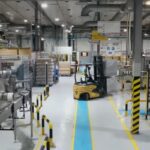nTop, a pioneering engineering software company, has launched advanced AI-powered design tools that are transforming product development across multiple industries. The platform’s breakthrough capabilities enable designers to create complex, unconventional designs with unprecedented speed and precision, marking a significant shift in how products are engineered and manufactured.
The innovative software leverages artificial intelligence and machine learning algorithms to dramatically accelerate design cycles, offering real-time feedback and performance improvements of up to 100 times faster than traditional methods. This technological advancement has already attracted major companies including Sauber Technologies, LightForce Orthodontics, and New Balance, who report substantial gains in design efficiency.
At the core of nTop’s innovation is its implicit modeling engine, which enables the creation of intricate geometries previously impossible in traditional CAD systems. The platform’s field-driven design approach allows engineers to incorporate simulation results and experimental data directly into their design process, producing pre-validated outcomes for complex engineering challenges.
The software’s impact spans globally across aerospace, automotive, medical, and consumer goods sectors. Engineers worldwide are utilizing nTop’s capabilities for diverse applications, from redesigning engine cylinders to optimizing automotive components. The platform’s ability to manage design complexity through mathematical principles, data integration, and logical frameworks has established new standards in product development.
The platform’s integration of AI in product design represents a significant advancement in manufacturing technology. As industries increasingly demand complex and customized products, nTop’s tools are positioning themselves as essential solutions for future product development needs. The software’s ability to handle multiphysics problems while leveraging existing engineering knowledge has made it particularly valuable for additive manufacturing applications.
This ongoing development suggests a future where product design becomes increasingly automated and optimized, potentially revolutionizing manufacturing processes across industries. The platform’s success in combining AI capabilities with traditional engineering principles indicates a transformative shift in how products will be designed and manufactured in the coming years.
News Source: https://blogs.nvidia.com/?p=79761









